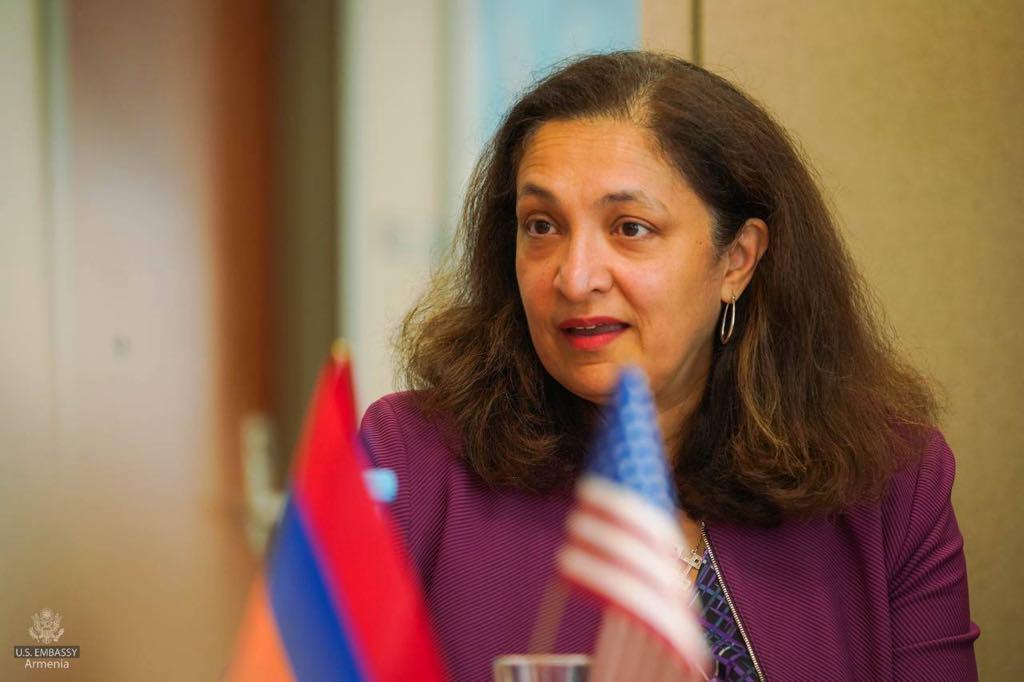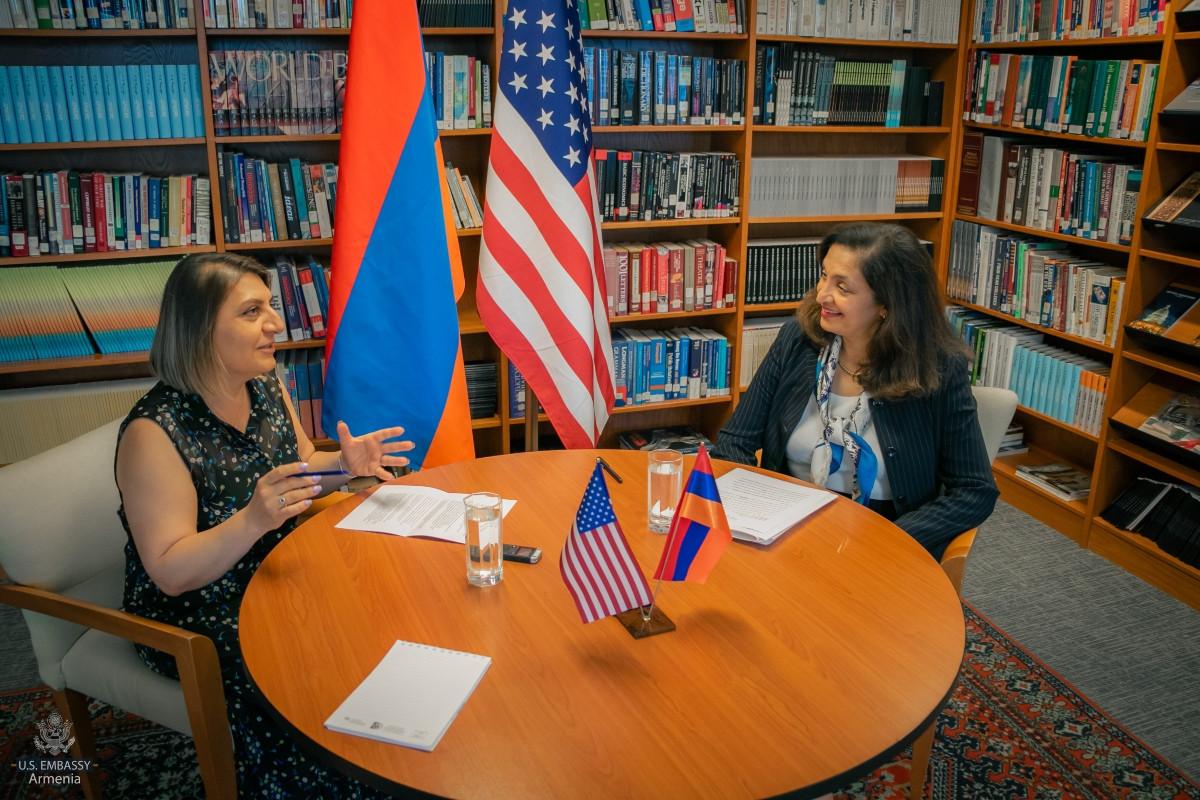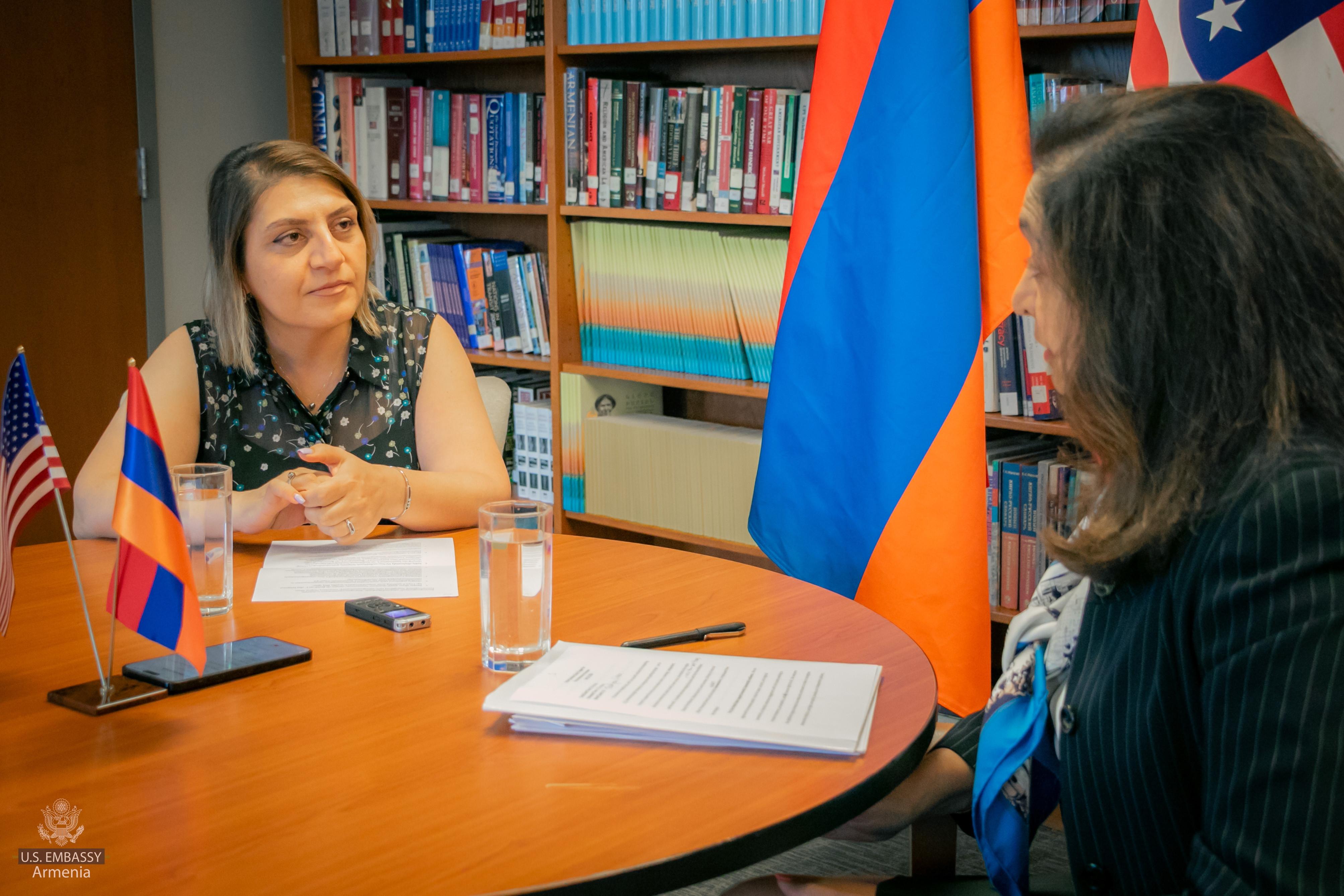
U.S. State Department Official: Armenia’s CSTO Membership No Hindrance to Greater Defense Cooperation with Washington
U.S. Under Secretary of State for Civilian Security, Democracy, and Human Rights Uzra Zeya was in Armenia from July 13-16. Hetq’s Liana Sayadyan spoke with Zeya about Armenian-American cooperation, American-mediated Armenian-Azerbaijani negotiations, the right of return of Artsakh residents, the preservation of Artsakh's Armenian heritage and ongoing democratic reforms in Armenia.
Hetq: Welcome to Armenia. What’s your impression of the country so far?
Zeya: Thank you, Liana, for the warm welcome. I want to say this has been a very impactful and inspirational visit. I can say with certainty that the deepening U.S. Armenia strategic partnership is strong and only getting stronger. I'm here in Yerevan to support the vision our two nations share - a sovereign, independent, democratic Armenia that's able to chart its own course connected to the region and the world.
I’ve had excellent and wide-ranging discussions over the last four days with the Prime Minister, Deputy PM, the Security Council Secretary, the Minister of Internal Affairs, the Prosecutor General and civil society leaders. I emphasized three key messages.
First, the United States supports Armenia's democratic resilience. We are aligned with the Armenian people's vision for peace, security, and regional connectivity. As I learned, there’s extensive engagement with civil society working to increase transparency, accountability, and human rights for all. We welcome the noteworthy progress Armenia has made and continues to make to strengthen democratic institutions and fight corruption, develop an independent judiciary, and enhance respect for human rights and fundamental freedoms. But we also acknowledge that there is more that still needs to be done.
Second, the United States is committed to bolstering Armenia's sovereignty and a dignified and durable peace that its people have sought for so long. I want to commend Prime Minister Pashinyan and his efforts to advance the peace process and build regional connectivity through the Crossroads of Peace initiative, unlocking tremendous social and economic potential throughout the South Caucasus. To this end, the U.S. Agency for International Development is funding a study on transportation integration to encourage and strengthen regional trade and connectivity through a just and durable peace.
Lastly, the United States commends and supports Armenia's tremendous efforts to welcome refugees and displaced persons from Nagorno-Karabakh now living in Armenia after suffering extreme hardship and vulnerability. Since last September, the State Department and USAID have provided US$11.5 million to minimize the strain on Armenian public service and infrastructure and help respond to their most urgent needs, including housing, employment, and education. This funding brings total U.S. humanitarian assistance in supporting NK refugees to nearly $31 million since September of 2020. In closing, I want to thank the Armenian Genocide Memorial and Museum for a profoundly moving visit where I paid my respects at the Eternal Flame. I came away from those two hours in awe of the resilience and determination of the Armenian people.
We, the United States, are more committed than ever to partnering to support a more sovereign, democratic, open, and secure Armenia that delivers for its citizens, the region, and the world. Thank you.
Hetq: You talked about stability and peace in the region and that the U.S. is actively involved in the peace process. Just last week, there was a trilateral meeting facilitated by Secretary Blinken between the foreign ministers of Armenia and Azerbaijan, after which Secretary Blinken said that the sides are very close to a peace deal. What’s the basis for his optimism given that we see Azerbaijan putting forward some unilateral demands.
Zeya: I think the meeting, which Secretary Blinken was honored to convene last week in Washington, reflects strong U.S. support for a dignified and durable peace between Armenia and Azerbaijan. We recognize that both countries have taken important steps that we want to continue to support. I think it's important to underscore here the impact of such a peace agreement, one that is dignified and durable, that would truly open extraordinary possibilities not only for both countries, but for the entire region.
The United States strongly supports these efforts. We believe Armenia and Azerbaijan are close to being able to reach a final agreement. But of course, ultimately, it's up to those at the negotiating table. We, for our part, will continue to strongly encourage them to maintain momentum to reach this goal. Just like PM Pashinyan’s Crossroads of Peace project. We think that pursuing a dignified, durable peace is critical to unlocking this region's immense social and economic potential, but also advances the regional connectivity that crossroads for peace puts forward.
Hetq: So, you think that economic benefits will serve as a trigger for the parties, specifically for Azerbaijan, to sign the peace agreement? Is the USAID study that you mentioned also focused on that?
Zeya: The USAID study I mentioned is looking at scoping the potential for integration of transport connections. With respect to what factors might be decisive for the Azeri side. I'm not able to speculate. Here, we echo the secretary's statements that it is up to those at the negotiating table. But for our part, for a believer in the tremendous potential of this dignified and durable peace, we will do everything that we are asked and that we can to try to support reaching this goal.
Hetq: Yesterday, the second joint military exercise between Armenia and the United States started. Does this indicate a strengthening defense partnership between the two countries, like what we've observed with France? Can we expect closer collaboration aimed at enhancing defense capabilities with Armenia? Is there a potential breakthrough on the horizon for military and defense cooperation between the U.S. and Armenia?
Zeya: Well, with respect to the Eagle Partner military exercise, I would stress this is a pre-planned exercise. It's focused on routine training and increasing readiness and interoperability and peacekeeping operations. This is an effort that is led on the U.S. side by our Department of Defense. As a State Department representative, I will leave further details with my Department of Defense colleagues.
But I will say that we are seeing a deepening of longstanding positive defense and civilian security cooperation between the United States and Armenia. You see that cooperation such as the Department of State, the Defense Department’s partnership program between Armenia and the Kansas National Guard, has been a positive initiative.
But on the State Department side, I am proud to lead our Bureau of International Narcotics and Law Enforcement, which is a key partner for the government of Armenia and the Armenian people in supporting, strengthening the capacity of Armenian police, with respect to respecting human rights, upholding the rule of law, fighting corruption, increasing transparency. And one of the many positive outcomes of this cooperation has been the introduction and the development of the Patrol Police Service, where earlier today, I was honored to visit the new headquarters for the patrol Police service with the Minister of Interior, a national dispatch center, and housing for the patrol police regiment, which is an outcome of considerable Armenian government and U.S. government investment in improving human centered rights, respecting policing that that increases public trust and ties between law enforcement and the communities they serve. This, I think, is an important example of how democratic reforms, increasing respect for human rights, can also increase security for all.
Hetq: One more question concerning U.S.-Armenia military, defense cooperation. Yesterday, there were reports that there will be a U.S. Army resident adviser in attached to Armenia’s Ministry of Defense. Can you confirm this news?
Zeya: I can confirm this. It’s a welcome development that I would encourage you to follow up with our ambassador and press team. We welcome deepening defense and civilian security cooperation between the U.S. and Armenia. This is part of the spirit embodied in the historic upgrade in U.S. Armenia relations to a strategic partnership.
Hetq: Is Armenia’s membership in CSTO an obstacle for deepening U.S.-Armenia partnership on defense cooperation. Will Armenia’s leaving CSTO boost the U.S.-Armenia defense cooperation?
Zeya: Armenia’s CSTO membership is something only the Armenian government can decide. We respect this. I would note that our defense and civilian security cooperation has continued to deepen, while Armenia has remained a member of CSTO. But I want to make a third and final point. The United States sees nothing to indicate that Russia's military presence contributes to a more peaceful and stable South Caucasus region.
Hetq: Reading your biography, I learnt about your efforts to help the Tibetan people to maintain their cultural, religious, language identity. Thus, I want to refer to Nagorno-Karabakh, where in the fall of 2023 over 100,000 people were displaced, and were subject to ethnic cleansing. Are the rights of ethnic Armenians considered in the negotiations process? Is their right to return part of the negotiations that the U.S. is facilitating?
Zeya: Thank you for this important question. Here, I would take a step back and just note that for decades the South Caucasus region has been trapped in a cycle of violence and instability. There has been enormous loss, grief, and tragedy. The United States supports creating the conditions for a dignified and durable peace in the region where the rights of everyone, no matter their ethnicity or their country of origin, are respected.
At the same time, the United States is concerned by the humanitarian and human rights crisis in Nagorno-Karabakh and the displacement of over 100,000 people that I referred to in my opening remarks. From a human rights perspective, I would refer you to our 2023 annual human rights reports that note allegations of human rights abuses and atrocities in and around Nagorno-Karabakh, and, for instance, the Azerbaijan Report for 2023 references credible reports of serious abuses in the conflict by Azerbaijan, including deliberate deprivation of items required by the civilian population and denial of humanitarian access. We continue to urge Azerbaijan to ensure the rights and security of those Nagorno-Karabakh Armenians who remain and to promptly create the conditions for safe, voluntary, dignified, and sustainable return of those who wish to go home.
I would again stress our praise for the tremendous efforts of the Armenian government to support this population, and the $11.5 million provided so far since September 2023 by the State Department and USAID.
Hetq: In case of return of the displaced Artsakh Armenians, do you believe it’s realistic to expect some international safeguards?
Zeya: This is an incredibly challenging question. It is a bedrock humanitarian principle of the United States that no population should be forced to return unless it’s a safe, sustainable, and voluntary act. I'm not sure I understand your question with respect to international guarantees, but it certainly is a well-established principle of international humanitarian law that this is what we expect and anticipate for vulnerable populations, including refugees and displaced persons.
Hetq: I meant Armenians will hardly decide to return without international security guarantees.
Zeya: I'm not exactly sure what security guarantees you refer to, by whom?
Hetq: International observers or peacekeepers?
Zeya: I'm not aware of any such discussion. That's why I was trying to understand the question. I'm not aware of any considerations of that kind, but I would reiterate that we continue to urge the government of Azerbaijan to ensure the rights and security of those who remain, and to promptly create the conditions for voluntary, safe, dignified, and sustainable return of those who wish to. It must be voluntary.
Hetq: One more question concerning Nagorno-Karabakh. We see much evidence and reports about Azerbaijan destroying the Armenian cultural heritage there including cemeteries and churches. Is the U.S. or the international community doing anything through UNESCO or other institutions to stop and prevent this?
Zeya: Thank you for raising this issue. To be clear, we support the preservation of Armenian cultural heritage across the South Caucasus. And this is a cultural heritage preservation is a global, U.S. policy. Maintaining cultural heritage sites, objects, traditions, requires care and vigilance. This is why the United States calls on countries around the world to protect cultural heritage in line with their international obligations and commitments.
We urge the government of Azerbaijan to honor its commitments under international law regarding preservation of cultural heritage. With respect to UNESCO, we believe the international community and organizations like UNESCO can and should play a key role in protecting the cultural heritage of all communities in the South Caucasus region.
Hetq: You mentioned democratic reforms in Armenia, describing them as inspiring. What reforms are you most pleased with?
Zeya: I would note some important reforms that have taken place in the anti-corruption and the civilian security sectors. In the anti-corruption space, the issue of asset forfeiture and creating the legal frameworks with which governments can reclaim. What we call ill-gotten gains by corrupt actors stealing from the patrimony of the country. This is a key element of U.S anti-corruption worldwide and the global anti-corruption strategy that the White House released in President Biden's first year in office.
I commend, the important progress the Armenian government has made in adopting asset forfeiture law and in building such capacity by the Prosecutor General's Office and the Ministry of Justice to pursue a sizable number of asset forfeiture cases where we've seen a positive trajectory, upward trajectory. My understanding is the current caseload of claims totals over $1 billion. Within a few years, millions of dollars have been recovered that belong to the Armenian people. This is a positive development. Certainly, there is more work to be done in the anti-corruption space. And this is a focus area of our partnerships, with the Armenian government and our Armenian civil society partners.
I will underscore that civil society, a free and independent media, investigative reporting outlets, and transparency and accountability experts, play a vital, indispensable role in in the fight against corruption here in Armenia and globally. Second point, where I see positive concrete results in the government's reform efforts is with respect to law enforcement reform.
The creation of the civilian led Ministry of Internal Affairs with the formation of the patrol police force, a force oriented around accountability to citizens, protection of citizens, and ensuring the safety and welfare of the citizens, are positive developments. I think that looking at public opinion surveys, there is a high degree of public trust in this relatively new patrol police force that I think is an encouraging development that we want to try to build upon in response to identified priorities from our Armenian partners to help support further training and professionalization of Armenian police, well as additional institutional reforms within the ministry.
Hetq: I would say that most of the cases you mentioned are based on investigative journalism. You referred to the State Department report, which highlighted that many cases involving corruption, abuse of power, or the illicit wealth of high-ranking officials may, in some instances, have political motives. While there have been positive developments, these processes still encounter significant challenges.
Zeya: Well, first and in conclusion, I thank you and I commend the important investigative reporting work done by Hetq and other media outlets in Armenia. We believe that a free and independent media plays a critical role in the anti-corruption fight. In my meetings, throughout this four-day visit, we had fruitful and detailed exchanges on our concerns, with respect to the anti-corruption fight. What I heard was a strong resolve from our Armenian government counterparts to carry the fight forward, to continue to improve and to institutionalize anti-corruption efforts throughout the government.
Hetq: Thank you very much for this interview and thank you for your time.
Zeya: I really enjoyed it. Thank you.
Photo credit: U.S. Embassy Armenia
 Videos
Videos Photos
Photos


Comments (1)
Write a comment